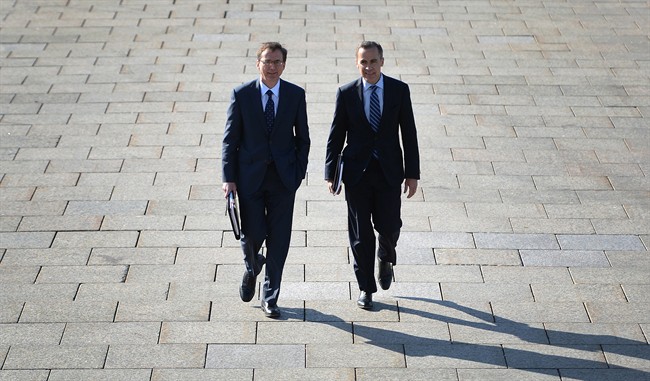OTTAWA – Bank of Canada governor Mark Carney says the controversial temporary foreign workers program should not be used to drive wages down or to fill low-skill jobs.

Speaking to the Commons finance committee for the last time before his departure to fill the top job at the Bank of England in June, Carney said the intent of the program is that it be used primarily to fill needs for high-skilled jobs temporarily, until businesses can train Canadians to take over.
In a two-hour appearance Tuesday, Carney used the occasion to touch on a number of other politically sensitive subjects as well, including the government’s move to increase tariffs on imports from 72 countries, the labour market and the Canada-U.S. retail price gap.
The foreign workers program became a political hot potato after news broke that an outsourcing company working for the Royal Bank (TSX:RY) had brought in foreigners to do jobs that had been held by about 45 Canadians at the bank. RBC chief executive Gordon Nixon later apologized and the government pledged to reform the program to ensure foreigners are not brought into the country for jobs already held by Canadians.
Opposition critics have complained the program is open to abuse, noting that at a time of relatively high unemployment and with 1.4 million Canadians looking for jobs, there are now about 330,000 temporary foreign workers in the country, more than double the number seven years ago.
The challenge of a skills shortage is not unique to Canada, Carney said, but the long-term solution is training not bringing in temporary foreign workers. Contrary to some views, he said, Canada’s labour market is among the most flexible in terms of mobility among industrialized countries.
“There are some signs of skills mismatches and we do believe employers play an important role to ensure (that) life-long skills development is a part of the nature of business in Canada,” he told the MPs.
He added that the program should concentrate on shortages of highly skilled workers, and not service jobs and other lower-wage categories that critics say are now being filled by foreign imports. The solution to that, said Carney, is for employers to pay higher wages and improve productivity.
“One doesn’t want an overreliance on temporary foreign workers for lower-skilled jobs, which prevent the wage adjustment mechanism for … making sure Canadians are paid higher wages, but also that the firms improve their productivity,” he explained.
Carney said he believes the Conservative government’s current review is intended to address those objectives.
In other testimony, the central banker said it is quite likely that interest rates will remain at current historically low levels for some time.
He said the bank policy-making team considers three main factors in its decisions about interest rates — unused capacity in the economy, inflation pressures and household debt and finances — and all currently point to the trendsetting policy rate remaining at one per cent.
Throughout the hearing, committee members of different stripes attempted to draw the governor into supporting their ideological views, with some level of success. An amused Carney noted on one occasion that his only advice to his successor might be not to answer a “loaded” question.
On one issue — the budget decision to lift preferential tariff treatment on 72 countries, including China — Carney conceded to the opposition MPs that in general terms, one objective for such a policy is to increase government revenues. Ottawa has estimated the higher tariffs on more than 1,000 consumer goods will bring in $350 million a year.
But he also sided with government members that another policy objective could be to help Canadian manufacturers compete with imports.
The question, posed by NDP MPs, was intended to solicit the response that the higher duties would exacerbate the price differential between the U.S. and Canada.
But Carney said that according to the bank’s own research, that gap has actually closed from the high teens to about eight per cent in the past two years, in part due to higher competition in Canada’s retail sector and also to the fact retailers needed to lower prices to discourage cross-border shoppers.
Carney said he believes there may always be a price gap between the two countries due to economies of scale the bigger and more concentred U.S. market allows and by the fact Canadian retailers have lower productivity and employ more workers on average than their American counterparts.
The meeting had its lighter moments. Senior deputy governor Tiff Macklem, the prohibitive favourite to replace Carney as governor of the Bank of Canada, was asked directly if he was interested in the job.
“If asked I will serve,” he said to smiles from the MPs, but would not elaborate further.
The meeting ended with committee chairman James Rajotte handing Carney a parting gift of what appeared to be a poster from his favourite team — the Edmonton Oilers — to take to London with him.


Comments